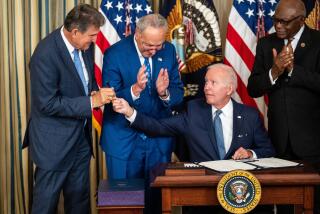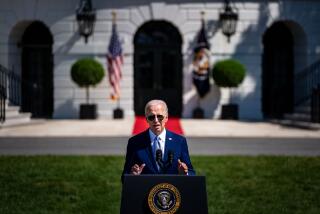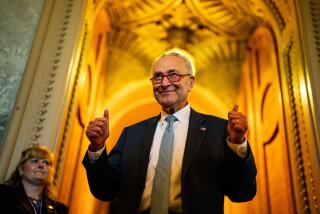Kennedy Draws Up Tobacco Bill
- Share via
Battle lines were clearly drawn Friday over the giant tobacco peace accord as three Senate Democrats, led by Edward M. Kennedy (D-Mass.), introduced a sweeping anti-smoking bill that would raise cigarette taxes by $1.50 a pack without granting legal protections to the industry.
The announcement came two days after a bipartisan group of senators introduced an industry-backed bill to implement the $368.5-billion truce negotiated last summer among tobacco companies, state attorneys general and private anti-tobacco lawyers.
Kennedy and his co-sponsors, Richard Durbin of Illinois and Frank Lautenberg of New Jersey, are among the tobacco industry’s staunchest foes in Congress. Their proposal would add billions of dollars a year to the cost of the June 20 settlement--generating more money for health and anti-smoking programs without giving tobacco companies anything in return.
As a result, their proposal will gain considerable support from health and consumer groups but has little chance to pass as written. Scott Williams, an industry spokesman, would not discuss details of the bill.
Together, Kennedy’s bill and the one filed earlier in the week by Sens. John McCain (R-Ariz.), Slade Gorton (R-Wash.), Ernest F. Hollings (D-S.C.) and John B. Breaux (D-La.) establish the boundaries of a possible legislated peace to be considered by Congress early next year.
Most observers believe that a congressional resolution, should one pass, will fall somewhere between the two.
Matt Myers, executive vice president of the National Center for Tobacco-Free Kids, praised the latest proposal but added: “None of these bills are going to be the final bill, and we’re going to have to work our way through it.”
His group had come out against the McCain bill when it was introduced on Wednesday.
Myers had helped negotiate the June 20 deal that the McCain bill would turn into law. But he has since said that criticism has exposed flaws in the settlement that must be addressed, a shift that reflects the fast-changing tides in the politics of tobacco.
In contrast to the deal, the Kennedy bill would:
* Raise the federal cigarette excise tax by 50 cents for three consecutive years. The tax hike would generate an estimated $600 billion to $650 billion over 25 years to be used by the states and federal government for medical research, smoking cessation and anti-tobacco ad campaigns and child development programs. By comparison, the settlement total of $368.5 billion over 25 years could be raised with a 65-cent-per-pack increase.
* Give the Food and Drug Administration unfettered authority to regulate nicotine and other ingredients in tobacco. Under the settlement, the industry would have an easier time challenging regulations.
* Provide none of the relief from lawsuits that brought the industry to the table in the first place. Under the June 20 settlement, the industry would get an end to class actions and lawsuits by the states and immunity from punitive damages in suits by individual smokers.
Both measures would mandate stronger cigarette warning labels, restrict advertising, require disclosure of tobacco ingredients, fund enforcement of bans on sales to kids and help rural communities hard hit by lower tobacco use.
In a statement Friday, Kennedy said the $1.50 increase is crucial to curbing smoking, particularly by teens. They “have less money to spend on tobacco products than adults and those who are not yet addicted will be less likely to spend their dollars on smoking,” Kennedy said.
More to Read
Sign up for Essential California
The most important California stories and recommendations in your inbox every morning.
You may occasionally receive promotional content from the Los Angeles Times.










